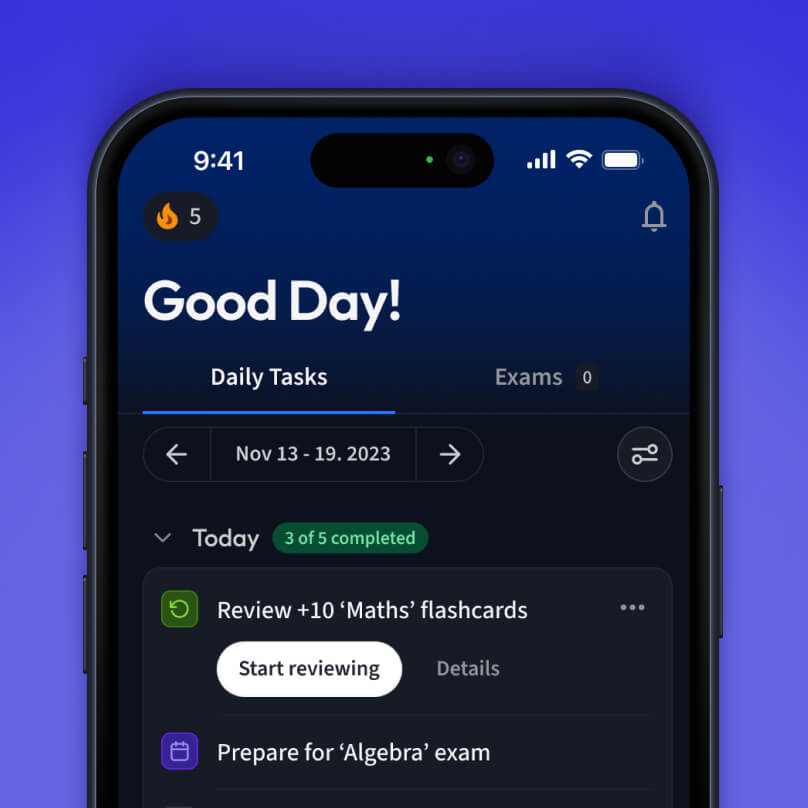What Are the GCSE Exam Dates for 2025?
The GCSE exams for 2025 are set to start on Monday, the 5th of May, and will end on Friday, the 20th of June.
All GCSE exams follow a timetable established by the Joint Council for Qualifications (JCQ). This means that every student across the UK must sit for their exams on the designated dates and times set by their specific exam board. The main exam boards for GCSEs in England are:
Wales and Northern Ireland have their own exam boards:
The following is a general guide; your specific exam dates might vary slightly depending on the exam board and your school. Make sure to verify the official timetable for your subjects.
GCSE Exam Timetable for 2025
Here’s an example of the GCSE exam timetable for 2025. Be sure to check with your exam board for the exact dates and times of your specific exams:
| Subject | Dates for Paper 1 | Dates for Paper 2 | Dates for Paper 3 | Dates for Paper 4 |
| Bengali | Tuesday 3rd June, PM (F- 35 mins, H – 45 mins) | Tuesday 3rd June, PM (F- 45 mins, H – 1hr) | Thursday 12th June, AM (F- 1hr, H- 1hr 15 mins) | |
| Biology | Tuesday 13th May, PM (1hr 45 mins) | Monday 9th June, AM (1hr 45 mins) | ||
| Business Studies | Friday 9th, PM (1hr 45 mins) | Friday 16th May, PM (1hr 45mins) | ||
| Chemistry | Monday 19th May, AM (1hrs 45 mins) | Friday 13th June, AM (1hr 45 mins) | ||
| Chinese (Mandarin) | Monday 12th May, PM (F- 35 mins, H – 45 mins) | Monday 12th May, PM (F- 35 mins, H – 45 mins) | Monday 19th May, PM (F- 1hr, H – 1hr 15 mins) | |
| Citizenship Studies | Thursday 8th May, PM (1hr 45min) | Thursday 15th May, PM (1hr 45 mins) | ||
| Combined Science | Tuesday 13th May, PM (Trilogy Biology: 1hr 35 mins) + (Synergy: 1hr 45 mins)
Monday 19th May, AM (Trilogy – Chemistry 1hrs 15 mins) Thursday 22nd May, AM (Trilogy Physics: 1hr 15 mins) |
Thursday 22nd May, AM (Synergy: 1hr 45 mins)
Monday 9th June, AM (Trilogy: Biology 1hr 15 mins) Friday 13th June, AM (Trilogy: Chemistry 1hr 15 mins) Monday 16th June, AM (Trilogy: Physics 1hr 15 mins) |
Monday 9th June, AM (Synergy: 1hr 45 mins) | Friday 13th June, AM (Synergy 1hr 45 mins) |
| Computer Science | Monday 12th May, PM (2hrs) | Tuesday 20th May, PM (1hr 45 mins) | ||
| Dance | Monday 2nd June, PM (1hr 30 mins) | |||
| Design and Technology | Wednesday 18th June, AM (2hrs) | |||
| Drama | Thursday 8th May, AM (1hr 45min) | |||
| Economics | Wednesday 14th May, PM (1hr 45 mins) | Thursday 22nd May, PM (1 hr 45 mins) | ||
| Engineering | Monday 2nd June, PM (2hrs) | |||
| English Language | Friday 23rd May, AM (1hr 45 mins) | Friday 6th June, AM (1hr 45 mins) | ||
| English Literature | Monday 12th May, AM (1hrs 45 mins) | Tuesday 20th May, AM (2hrs 15 mins) | ||
| Food Preparation and Nurtition | Tuesday 17th June, PM (1hr 45 mins) | |||
| French | Wednesday 21st May, AM (F- 35 mins, H – 45 mins) | Wednesday 21st May, AM (F- 45 mins, H – 1hr) | Thursday 5th June, PM (F-1hr, H-1hr 15 mins) | |
| Geography | Wednesday 14th May, AM (1hr 30 mins) | Friday 6th June, PM (1hr 30 mins) | Tuesday 17th June, AM (1hr 30 mins) | |
| German | Thursday 8th May, PM (F- 35 mins, H – 45 mins) | Thursday 9th May, PM (F- 45 mins, H – 1hr) | Thursday 15th May, PM (F- 1 hr, H-1hr 15 mins) | |
| History | Friday 16th May, AM (2hrs) | Thursday 5th June, AM (2hrs) | ||
| Italian | Monday 2nd June, AM (F- 35 mins, H – 45 mins) | Monday 2nd June, AM (F- 45 mins, H – 1hr) | Monday 9th June, PM (F-1hr, H- 1hr 15 mins) | |
| Mathematics | Thursday 15th May, AM (1hr 30 mins) | Wednesday 4th June, AM (1 hr 30 mins) | Wednesday 11th June, AM (1hr 30 mins) | |
| Media Studies | Wednesday 14th May, PM (1hr 30 mins) | Thursday 22nd May, PM (1 hr 30 mins) | ||
| Modern Hebrew | Thursday 12th June, PM (F-35 mins, H- 45mins) | Thursday 12th June, PM (F- 45 mins, H- 1hr) | Thursday 19th June, AM (F- 1hr, H- 1hr 15 mins) | |
| Music | Monday 16th June, AM (1hr 30 mins) | |||
| Panjabi | Tuesday 3rd June, PM (F- 35 mins, H – 45 mins) | Tuesday 3rd June, PM (F- 45 mins, H – 1hr) | Thursday 12th June, PM (F- 1hr, H- 1hr 15mins) | |
| Physical Education | Monday 19th May, PM (1hr 15 mins) | Monday 9th June, PM (1hr 15 mins) | ||
| Physics | Thursday 22nd May, AM (1 hr 45 mins) | Monday 16th June, AM (1hr 45 mins) | ||
| Polish | Tuesday 3rd June, PM (F- 35 mins, H – 45 mins) | Tuesday 3rd June, PM (F- 45 mins, H – 1hr) | Friday 13th June, PM (F- 1hr, H- 1hr 15mins) | |
| Psychology | Thursday 8th May, AM (1hr 45min) | Thursday 15th May, PM (1hr 45 mins) | ||
| Religious Studies | Tuesday 13th May, AM (A+B, 1hr 45 mins each) | Wednesday 21st May, PM (A+B, 1hr 45 mins each) | ||
| Sociology | Friday 9th May, AM (1hr 45 mins) | Tuesday 20th May, PM (1hr 45 mins) | ||
| Spanish | Tuesday 10th June, AM (F- 35 mins, H- 45 mins) | Tuesday 10th June, AM (F- 35 mins, H- 45 mins) | Tuesday 17th June, AM (F- 1hr, H- 1hr 15 mins) | |
| Statistics | Monday 2nd June, AM (F+ H 1hr 45 mins) | Friday 13th June, PM (F+ H 1hr 45 mins) | ||
| Urdu | Monday 19th May, PM (F- 35hr, H – 45 mins) | Monday 19th May, PM (F- 45 mins, H – 1hr) | Monday 2nd June, AM (F- 1hr, H – 1hr 15 mins) |
This is a general guide; your specific exam dates might vary slightly depending on the exam board and your school. Make sure to verify the official timetable and exam board for your subjects.

What Date Is the Last GCSE Exam 2025?
The GCSE exams officially finish on Friday, the 25th of June. However, a contingency day is scheduled on the final day of the GCSE exam timetable to accommodate any national or significant disruptions that may occur during the exam period.
After the exams are completed, GCSE Results Day is set for Thursday, 21st August. This gives you time to relax over the summer, work, volunteer, or plan your next steps in education.
Getting ready for your GCSEs
You can find Explanations, GCSE study tips, relevant articles and past papers in our GCSE Revision hub.
Tips for GCSE Exam Preparation
With the 2025 GCSE exam dates in mind, it’s important to prepare effectively. Here are some tips from StudySmarter to help you get started:
- Start Early: Begin your revision months in advance to avoid the last-minute rush.
- Create a Study Schedule: Break down your syllabus into subjects and topics, prioritizing areas you find challenging.
- Use Active Revision Techniques: Utilize spaced repetition, active recall, and flashcards to reinforce your learning.
- Use Timetabling Tools: Use a digital calendar or a study planner to organize your study time and schedule regular breaks. The pomodoro technique is great for focus periods and scheduling breaks!
- Condense Your Notes: Summarize key points to make revision easier and focus on understanding rather than rote learning.
- Practice with Past Papers: Familiarize yourself with exam formats and marking schemes by practicing past papers.
- Practice Exam Writing: Time yourself when answering questions to get used to exam conditions and refine your writing technique.
- Develop Healthy Study Habits: Ensure you get enough sleep, eat well, and manage stress through mindfulness techniques. Headspace is a great tool for stress management!
- Choose the right study app: Incorporate study apps like StudySmarter into your revision to organize your notes and track your progress.
Important things to remember for GCSE Exam Day 2025
Here are some helpful things to remember for any day of your GCSE exams in 2025:
Before the Exam:
- Get Plenty of Rest: Ensure you have a good night’s sleep before the exam day. Being well-rested helps you stay focused and think clearly during the exam.
- Eat a Healthy Breakfast: Start your day with a balanced breakfast that includes protein, whole grains, and fruits. This will help maintain your energy and concentration levels throughout the exam. Avoid heavy, greasy, or sugary foods that can make you feel sluggish.
- Check Exam Details: Confirm the time and location of your exam. Make sure you know exactly where to go and at what time to avoid any last-minute panic. Arriving late can sometimes mean you won’t be allowed to take the exam.
- Prepare Your Materials the Night Before: Pack your bag with all the necessary items:
- Black pens (at least two, as exams must be completed in black ink)
- Pencils, a ruler, eraser, and any other required stationery
- A calculator (if allowed for the specific exam) with fresh batteries
- Your school ID or candidate number (if required)
- Ensure that prohibited items, like mobile phones or smartwatches, are left at home or stored according to exam regulations.
- Stay Hydrated: Drink water before the exam to keep yourself hydrated. If allowed, bring a clear, label-free water bottle into the exam room. Staying hydrated helps with concentration and reduces fatigue.
- Arrive Early: Aim to arrive at the exam venue at least 30 minutes early. This gives you time to settle down, find your seat, and calm your nerves before the exam begins.
- Stay Calm and Focused: Avoid last-minute cramming. Use the time before the exam to relax and mentally prepare. If you feel anxious, practice deep breathing exercises to calm your nerves.
During the Exam:
- Listen to Instructions: Pay close attention to the invigilator’s instructions before the exam begins. Make sure you understand all the rules and procedures, including how to fill in your candidate information on the answer booklet.
- Read the Questions Carefully: Once the exam starts, take a few minutes to read through all the questions carefully. Make sure you understand what each question is asking before you start writing. Misinterpreting a question can cost you valuable marks.
- Manage Your Time: Allocate your time wisely for each section or question based on the marks available. If you get stuck on a question, move on and come back to it later if time permits. Use the final few minutes to review your answers.
- Use the Full Exam Time: If you finish early, use the remaining time to review your work. Check for any mistakes, ensure you’ve answered all parts of each question, and add any additional information that could earn you more marks.
- Follow Exam Protocols: Adhere strictly to exam rules. Do not bring in unauthorized materials, do not talk to other candidates once inside the exam room, and follow all instructions from the invigilators. Any rule violation can lead to disqualification.
- Use Breaks Wisely: If your exam schedule includes a break (such as between multiple papers), use it to rest, hydrate, and have a light snack if needed. Avoid discussing the exam with others during breaks, as this can increase anxiety.
Use StudySmarter to help you ace your GCSEs
As the 2025 GCSE exam days approach, make sure you have your official timetable ready, stay organized, and prepare effectively. StudySmarter offers a comprehensive learning app with expert-verified explanations, AI-powered flashcards, and other revision materials to help you excel in your exams.
Download it today and set yourself up for success in your GCSEs and beyond.
Frequently Asked Questions (F.A.Qs)
The GCSE exams for 2025 are set to start on Monday, the 5th of May, and will end on Friday, the 20th of June.
The GCSE exams for 2025 are set to finish on Friday, the 20th of June with Modern Hebrew Paper 4 (AM) being the last exam.
The GCSE exams for 2025 are set to start on Monday, the 5th of May, but the first exam will be Drama on Thursday 8th May AM.
How we ensure our content is accurate and trustworthy?
At StudySmarter, we have created a learning platform that serves millions of students. Meet the people who work hard to deliver fact based content as well as making sure it is verified.

Gabriel Freitas is an AI Engineer with a solid experience in software development, machine learning algorithms, and generative AI, including large language models’ (LLMs) applications. Graduated in Electrical Engineering at the University of São Paulo, he is currently pursuing an MSc in Computer Engineering at the University of Campinas, specializing in machine learning topics. Gabriel has a strong background in software engineering and has worked on projects involving computer vision, embedded AI, and LLM applications.
Get to know Gabriel




